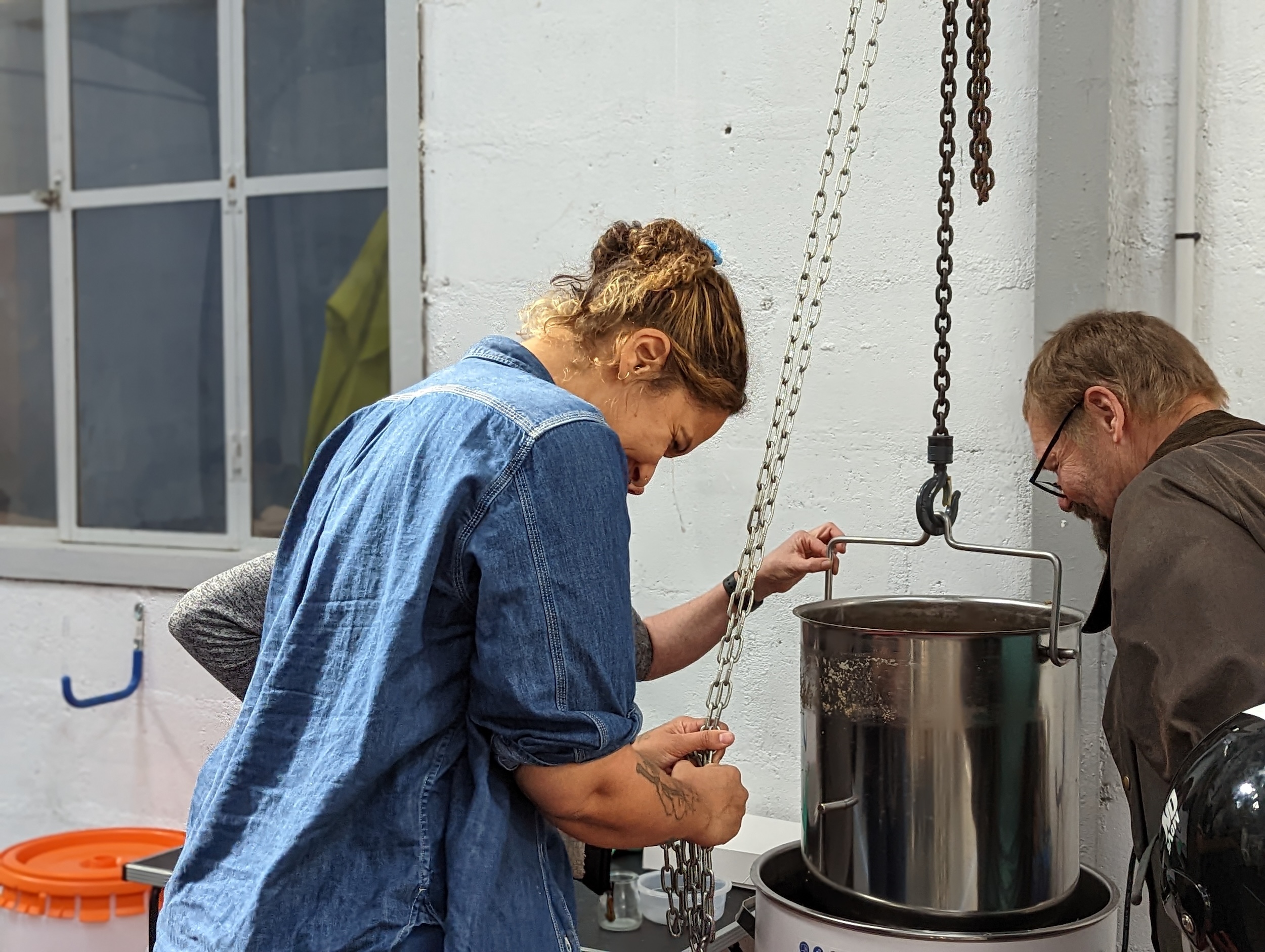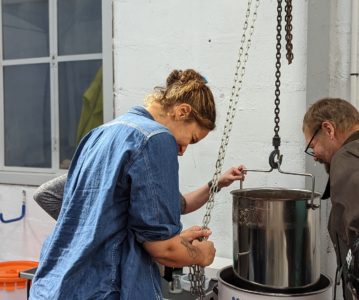Léa Le Faucon, a French tattoo artist, never went to a beer festival before she organized one.
In October 2022, the first Brasseuses Semeuses festival took place in Saint-Nazaire, Western France, with one goal: to shed the light on female brewers (brasseuses) and farmers (semeuses). The concept emerged when Le Faucon made a beer with Geovanni Olivares, founder of Brasserie Veracruz and fellow organizer of the event, and he talked about beer history and the importance of women in it.
“It upsets me that I didn’t know about this despite being a feminist,” she says. “It felt like we needed to do something about it because knowledge is a privilege and it’s important to share it.”
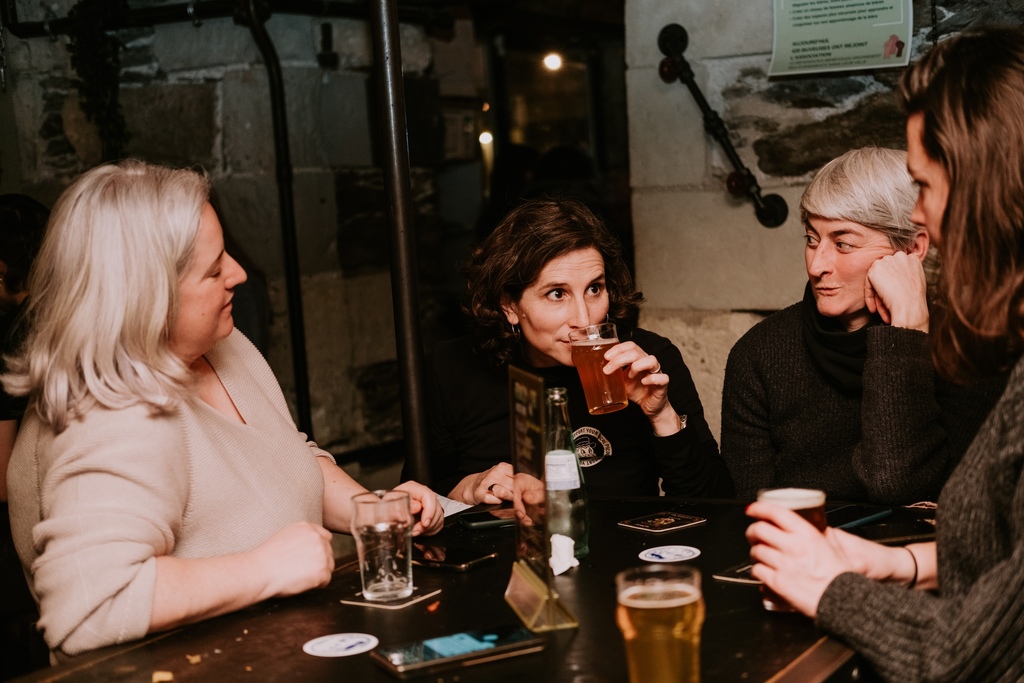
Brasseuses Semeuses is unique compared to what you can usually find at beer-related events in France, where the breweries that get invited will most likely be owned by men—I know it because I’ve been gathering data on it since 2019—which makes female drinkers and gender minorities working in the industry sick of being left out.
Breweries owned by men make up at least 80% of attendees, sometimes even more. The other 20% are generally co-owned by men and women, while women-only breweries rarely make the guest list. At Brasseuses Semeuses, 100% of the invitations—to brewers, farmers, tattoo artists, speakers—were handed to women.
“The idea that this kind of event didn’t exist in France was a good enough reason for us to throw it,” Le Faucon says.
Brasseuses Semeuses felt like a breath of fresh air for Carol-Ann Cailly, beer sommelier and co-founder of Buveuses de Bières, an association for women and non-binary beer lovers in France, who gave a talk on sexist beer marketing and labels. (I also gave a presentation at the festival on women in beer history.)
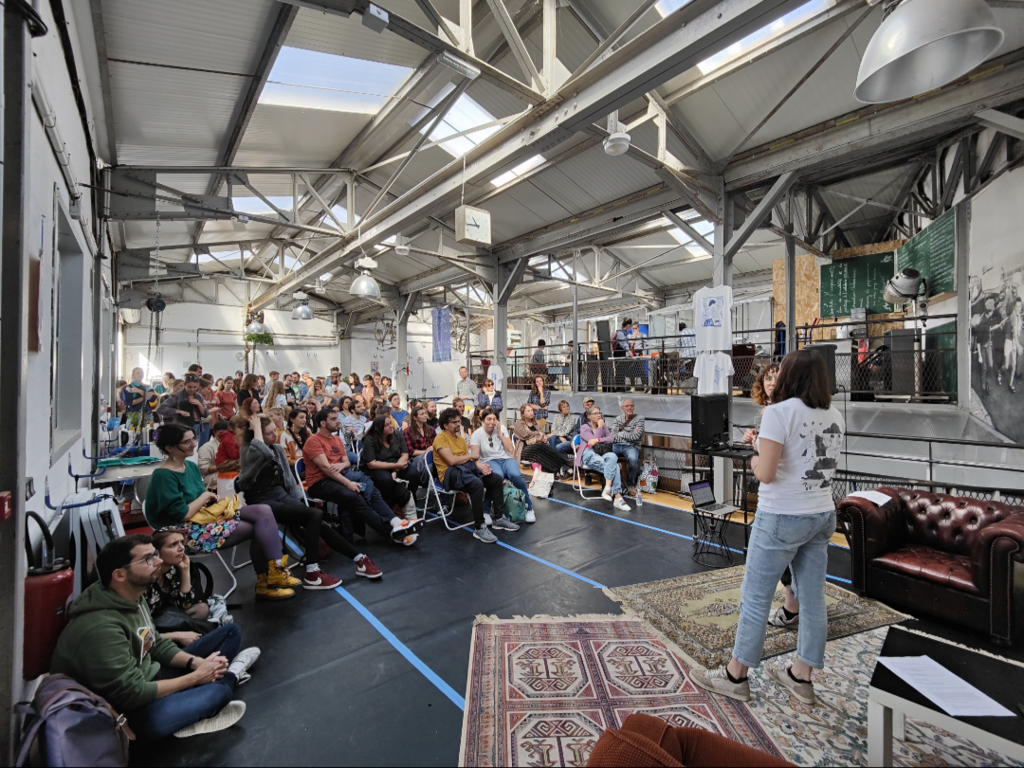
“I didn’t feel like I was the feminist you invite to keep a good conscience, because the event itself was tailored around inclusivity and feminism,” something that she says often lacks in other beer festivals. Female brewers and beer experts weren’t there as tokens; they were the focus.
Not waiting another second for the craft beer scene to fully include them, French women are taking the matter into their own hands by launching their own events—or refusing to attend the ones that don’t align with their values—creating safer and more inclusive spaces for them and people of minority backgrounds.
Let’s Get Political
When faced with criticism regarding diversity, event organizers and beer superfans usually respond to the disapproval privately by insisting that they don’t want to get political. They say that the small percentage of women and non-binary people invited is simply a representation of the beer industry—one where gender minorities, LGBTQIA+ folks or BIPOC don’t seem to exist at all.
One could argue that if beer festivals wanted to accurately reflect the state of the beer industry in France, they’d invite the world’s largest brewers, since the Heinekens and Anheuser-Busch InBevs of the world make up at least 90% of the market share in France.
But these events make the choice to only invite craft breweries or independent breweries—already a “political” choice.
Representing the diversity of people working in the industry shouldn’t be seen as a controversial decision. Marie-Emmanuelle Berdah and Juliette Phuong, the other co-founders of Buveuses de Bières, say they’re tired of these false excuses.
“Beer festivals are designed with a specific demographic in mind, one of a white male beer geek, and I’m not on that spectrum,” Phuong says. “When you organize an event, your goal is to attract beyond the people that you already know will show up, but most beer festivals fail to do that and only pander to that one audience.”
Berdah agrees: “As a woman in a craft beer festival, I have to adapt and fit into the mold presented to me. I’m not considered a part of the target audience.”
Karim Dubois, in charge of organizing the 2023 Paris Beer Festival says that the numbers I published made the association realize they needed to change. For the last few years, no more than 9% of the breweries pouring at the Paris Beer Festival were women-owned or co-owned. In 2023, that number went up to 30%.
Odile Bondier, founder of Odile t’en Brasse, a microbrewery in rural Burgundy, got an invite this year: “I was honored to be a part of this event but at first, I had the impression that it was a feminist quota that they were inviting.”

Once on site, she says the mood was overall very positive and was glad to meet with other feminist brewers. But she was also hesitant to accept the invitation because of the cost such an event would represent for her small brewery.
Dubois realized this gap when female brewers started declining his invitation due to economic reasons. “In comparison, we receive emails from breweries that are only 6-months-old and pressure us to be on the guest list, no matter the cost: They’re always owned by men,” he says.
Buveuses de Bières founders believe that beer festivals should stagger the fees according to the size of the brewery to promote diversity. They say women mostly own small breweries with little to no budget allowed to this kind of event, keeping them away from the spotlight.
A 2019 survey found that French women who start their own businesses report experiencing twice as many rejections as male respondents when applying for bank loans. Starting a small brewery is difficult for most entrepreneurs; it’s doubly so for French women.
Make It Safe
More than just the cost, it’s also the general atmosphere that doesn’t suit some brewers, like Véronique Lanceron and Véronique Vérisson, owners of Y’a une Sorcière dans ma Bière, near Bordeaux. They decline most invitations they receive.
“We don’t feel like we belong at beer festivals where trendy brewers talk in complicated technical terms to amaze consumers who don’t understand a thing,” they say. “It’s becoming more and more elitist and it’s not our vision of beer.”
Having a more diverse guest list isn’t the only thing they’d like to see improve.
“We all had bad experiences with drunk men at beer festivals, it’s part of the checklist,” Berdah says. She bemoans the heavy drinking—presented as tasting—that often takes place at festivals and makes the venue feel less and less safe, especially for women, as the hour passes.
Cailly shares that following an incident in which she was called a misogynistic slur, she no longer wants to attend beer festivals alone. That’s why she was glad to see Buveuses de Bières members spontaneously grouping to go to beer festivals, thanks to the discussion channels the association set up on WhatsApp.
There, they can reach out to other members from their region to plan events. They use it to regroup each time a festival is happening in their town, spending the event together in a safer environment.
“Some would not attend festivals if they were alone. It gives them legitimacy and confidence to go as a group,” Cailly says. “They go there with their Buveuses de Bières stickers or t-shirts, identified as such, they’re taken a bit more seriously.”
Drunkenness is also the reason why Phuong doesn’t feel like attending with her young daughter, a problem that she thinks keeps lots of parents, specifically mothers, away from the beer world. “Sure it’s a beer festival but you can do more than just drinking it; you can read about it, learn about it, create activities for children,” she says.
This realization led some events like Paris Beer Festival or Metz Beer Fest to publish a code of conduct, signed by the breweries and agreed upon by anyone who buys a ticket. At Brasseuses Semeuses, flyers were displayed everywhere to warn people about prohibited behaviors and encourage guests to reach out to the team if anything happened to them or others, so that the person can be removed from the venue. In Paris and Metz, the organizers also commit to support victims if they were to press charges.
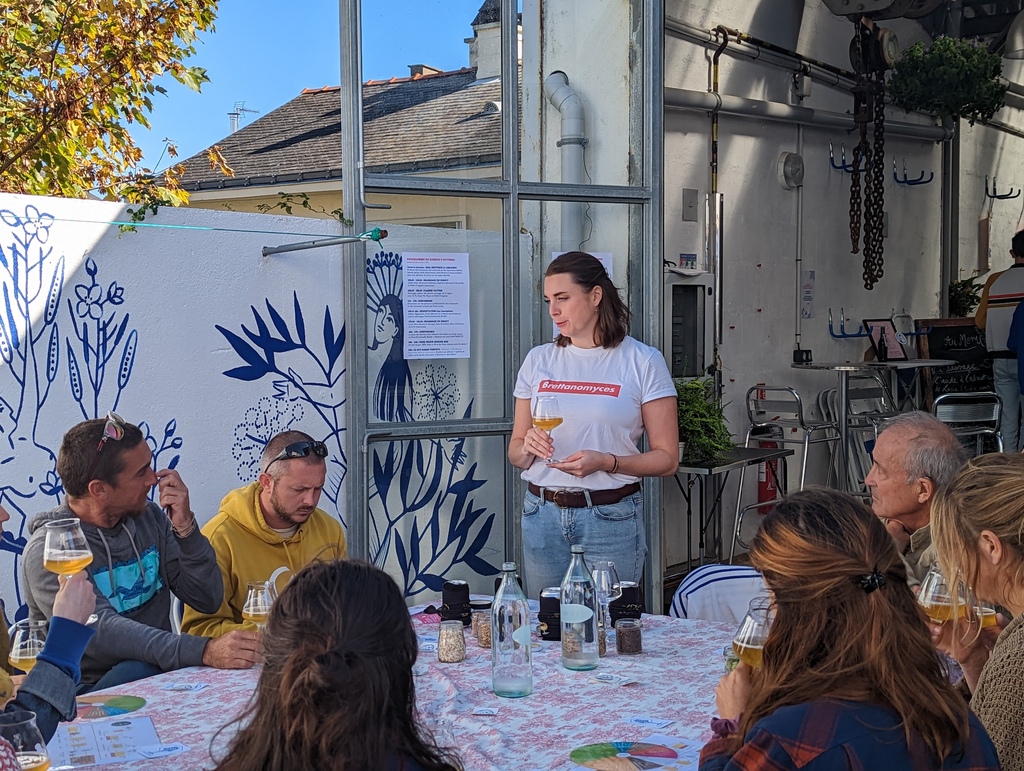
“The goal of Brasseuses Semeuses is to come and learn things about beer, its history, how it’s made and by whom, not to get drunk,” Le Faucon says. “That’s why the bar wasn’t central to our event. We had a library, public brews, tattoo artists, conferences and panels, tastings with a beer sommelier.”
Inclusivity Works
For the women I spoke to, there’s no doubt: Having a feminist and inclusive organizer is reassuring for them. Rather than attend events where they don’t always feel comfortable, they work on making their own.
Since they opened their taproom, Vérisson and Lanceron threw a feminist dancing party, and an anarcho-feminist choir sings regularly at the brewery.
Like them, Bondier is more focused on local events as she’s part of a queer, feminist and eco-conscious collective in her area. “That way, I’m not the only lesbian feminist there, it feels more radical and committed to inclusivity,” she says.
Buveuses de Bières is already organizing events everywhere in France, whether it’s brewery visits, beer tastings, bottles shares or beer-hiking days for their 500 members. Their next step is to plan their own beer festival and they hope to do so in a few years.
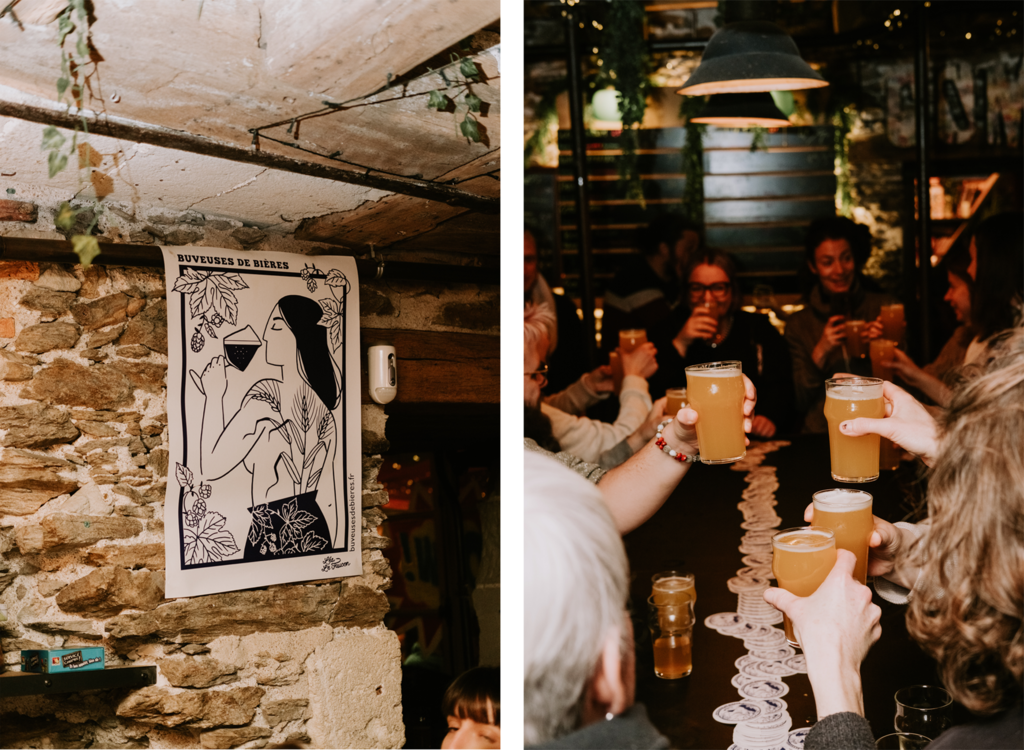
“The smartest choice we can make is to reach out to other feminist organizations to plan it together. We don’t want to make it 100% about beer,” Phuong says.
In the meantime, Brasseuses Semeuses will come back in October 2024 with a bigger venue due to the success of the first edition.
If you needed more proof that openly sharing your values and commitment to inclusivity doesn’t scare people away, it may be a good idea to get a little bit more political after all?

